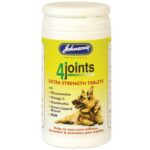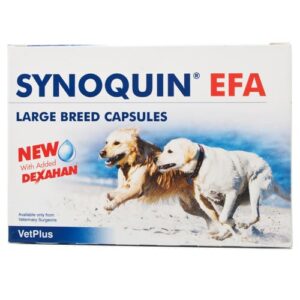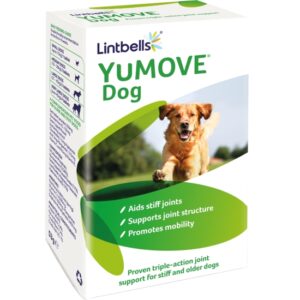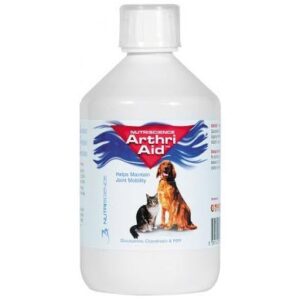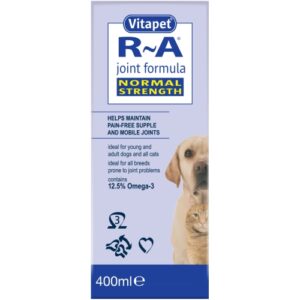Vetpharmacy.co.uk Cookie Policy : We use cookies to enhance your user experience. To find out more please view our cookie policy
Cat and Dog Joint Care
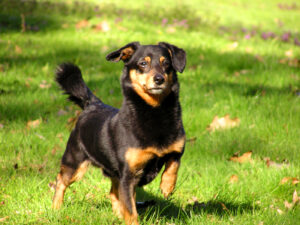 As we get older, our joints start to deteriorate. This is the same with cats and dogs too - it is estimated that 20% of cats and one in seven dogs suffer from arthritis. Just as we take joint supplements, you should consider giving these to your pet too. Unfortunately they can't tell you when they are in pain, so the onus is on us to know what to look out for:
As we get older, our joints start to deteriorate. This is the same with cats and dogs too - it is estimated that 20% of cats and one in seven dogs suffer from arthritis. Just as we take joint supplements, you should consider giving these to your pet too. Unfortunately they can't tell you when they are in pain, so the onus is on us to know what to look out for:
Arthritis in dogs
This usually targets around the paws, shoulders and lower back. While it is usually seen in older dogs, it can develop from an early age following problems with bone and joint development. Certain large breed dogs are more prone to arthritis, including Labrador Retrievers, Golden Retrievers, German Shepherds, Rottweilers and Great Danes. In addition, dogs that are part of the chondrodystrophoid group such as Dachshunds, Bulldogs and Basset Hounds are genetically predisposed to joint and cartilage disorders. Here's what to look out for:
- Difficulty jumping up and down from surfaces or furniture, going up and down stairs and getting in and out of the car.
- Preferring to lie down rather than sit or stand.Stiffness, especially after resting.
- Licking their joints.
- Difficulty reaching down to their food and water bowl.
- Lagging behind or tiring easily during walks.
- No longer running to greet you.
- Being quieter than usual and/or interacting less with the family.
- Acting defensively and getting irritable or growling or whimpering if touched.
Arthritis in cats
Cats are experts at hiding discomfort and pain, so often do not demonstrate obvious signs you would expect and very rarely show signs of limping or pain associated with arthritis so it is very important for cat owners to know what to look out for:
- Sleeping more and/or being less active.
- Being less willing to jump up or down.
- Only jumping up or down from lower heights.
- Showing signs of stiffness.
- Being more reluctant to greet you or interact with you.
- Play with other animals or toys less.
- Having a poor coat/spending less time grooming.
- Showing signs of lameness or limping.
- Having more accidents outside the litter tray.
- Having difficulty getting in or out of the cat flap.
- Having difficulty going up or down stairs.
Adding a joint care supplement to your pet's diet
So you've decided to add a joint care supplement to your pet's diet, but which one do you give? Navigating this area can be a minefield so here we summarise the main ingredients used in cat and dog joint care supplements and compare some of the most popular ones. When considering the cost, don't forget to factor in dosage as some of the cheaper ones may require more than one tablet/capsule per day.
Glucosamine
A substance naturally found in the body, glucosamine contributes to the formation of the joint building blocks (glycosaminoglycans) needed to make cartilage, tendons, ligaments and joint fluid. It also acts as a biological signal to switch on the repair of these tissues and to suppress inflammation and the breakdown of cartilage. Its production declines with age, so supplementing a healthy diet with glucosamine could help to ease achy joints and stiffness.
Chondroitin
Chondroitin is a substance that occurs naturally in the connective tissues of animals and is a vital part of cartilage. Studies have found that taking chondroitin can prevent cartilage breaking down and can also stimulate its repair mechanisms. Chondroitin is most commonly found in joint supplements alongside glucosamine.
MSM
MSM (methyl-sulfonyl-methane) is a natural sulfur compound that is claimed to be an antioxidant, cell rejuvenator and joint healer. It has anti-inflammatory and pain reducing properties and is reported to enhance the structural integrity of connective tissue.
Omega 3 Fatty Acids
Omega 3 fatty acids help to reduce inflammation and help to block the production of enzymes responsible for joint degradation. They have also been shown to decrease symptoms of morning stiffness, tender or swollen joints and joint pain in humans and are thought to have a similar effect in animals. As well as helping to support joints, omega-3 fatty acids also support your pet's skin and coat condition and help promote a healthy heart and brain.
Green-Lipped Mussel
Native to New Zealand, Green-Lipped Mussels are rich in omega-3 fatty acids and have a unique combination of other fatty acids not found in any other marine or plant life that make them a great natural anti-inflammatory. Studies have also shown that they are used in order to reduce pain, and they can act as a feeding stimulant.
Hyaluronic Acid
Hyaluronic Acid is a major part of the cushioning 'synovial' fluid in the joint, therefore supplementation can help to lubricate, cushion and make your pet feel more comfortable.
Rosehip
Rosehip is a herbal medication with anti-inflammatory properties. It works in a similar way to aspirin, hindering a group of enzymes involved in the pain and inflammation process. It has been shown to inhibit the activity of inflammatory white blood cells, while also lowering levels of inflammatory markers in the blood.
Collagen
Collagen is the dominant protein in the connective tissue, found in the muscles, tendons, bones, cartilage and skin. Research has found that taking collagen can improve the symptoms of arthritis by stimulating the body's production of joint collagen.
What else can I do to support my pet's joints?
- Ensure your pet maintains a healthy weight: As with humans, excess weight puts extra pressure on the joints, so aim to keep your pet's weight within the recommended range for its breed. Talk to your vet as they may recommend a specific weight management food and/or enroll your pet on a weight loss programme.
- Encourage regular, gentle exercise: This is important to avoid stiffness and muscle wastage. Encourage cats to play each day and take dogs for several short walks each day instead of a long one.
- Feed a good quality, healthy diet: Avoid too much rich or fatty food and give as much fresh food as possible. Try feeding two or three small meals a day rather than one large one. Speak to your vet who may recommend a specialised mobility formula food.
- Raise water and food bowls: If your pet has difficulty bending down, raise its bowls. You can buy stands specifically for this purpose, or simply put them on top of a box or a piece of wood.
- Keep your pet warm and cosy: Cold, damp and windy conditions can aggravate joint pain so avoid your pet going out in horrible whether where possible. Provide a warm, soft place to sleep with enough room to find a comfortable position to sleep in. For cats, try an 'igloo' bed as this can minimise drafts and make your cat feel warm and secure.
- Reduce the amount of jumping your pet has to do: Try to arrange your pet's eating and sleeping areas to minimise use of stairs and jumping on and off furniture. Provide steps or ramps or rearrange furniture to help cats access their favourite higher spots such as windowsills and sofas and ensure their litter tray has at least one low side for easy access.
- Support their grooming: Arthritic pets may find it difficult to groom as normal so spend time grooming them and don't forget overgrown claws need regular cutting.
Remember, if you see any changes in your cat or dog, always consult your veterinary surgeon.
